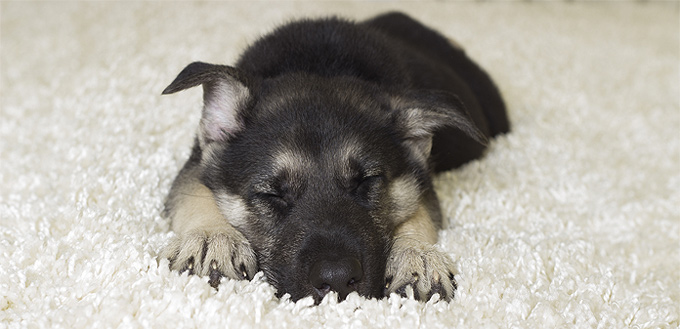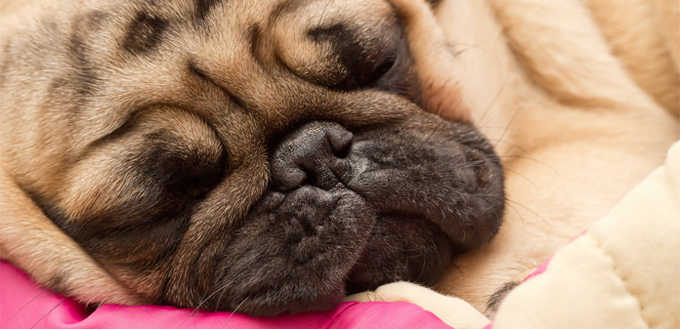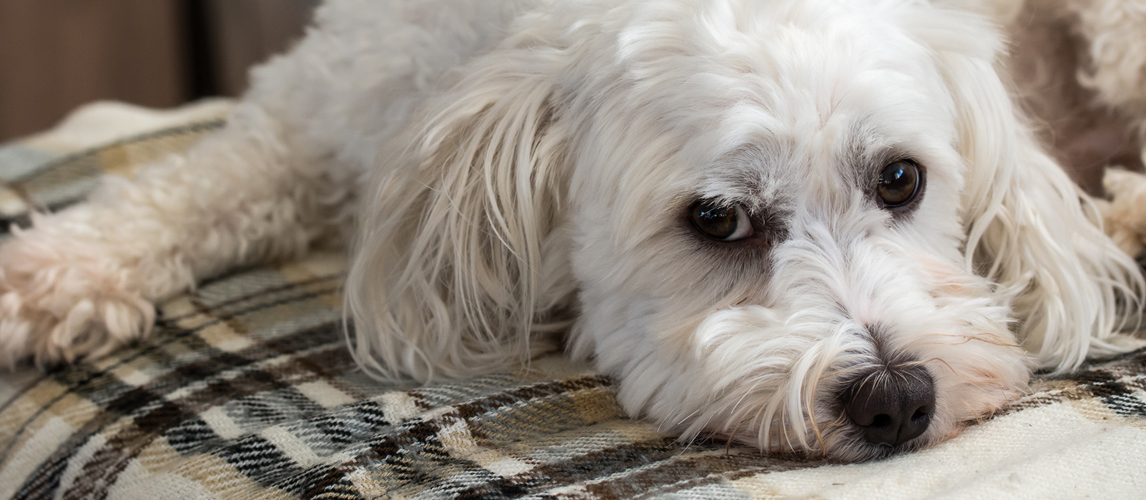The first thing to say is that if your dog has always snored, but is otherwise happy, active and doglike you probably have nothing to worry about, but if he suddenly starts snoring, or doesn’t seem right, you should get him checked over by your vet.

What Is Snoring?
The restricted movement in the nasal passages and/or throat causes snoring. There can be a number of reasons for this, not all of them serious or life-threatening.
Some Dogs Are Pre-Disposed To Snore
If you have a dog with a broad, short skull and a short snout then its anatomy makes it predisposed to snore.
The shape of your dog’s neck, the length of his nose and the way he chooses to sleep are other things that could make a dog snore.
That doesn’t mean that it’s fine though, so if you have any concerns about your dog’s health or wellbeing, get him check by your vet to make sure there is no underlying problem.
Other Causes Of Snoring
- Sleeping on his back – Just like humans, if a dog sleeps on his back his tongue will fall back, obstructing the airway. Dogs may well choose to sleep on their backs because the weather is hot and the thinner fur on the tummy and sweat glands in the paws make it easier to cool off this way. This position also indicates your dog is comfortable as he’s exposing his most tender parts to attack and also making it difficult to get up onto his feet. You could try putting a pillow under your dog’s head to open up his airways a bit or hope that he turns over and stops snoring naturally.
- Sleep apnoea – Is rare in dogs, but can occur. Just like in the human condition dogs can stop breathing when they sleep, this can particularly happen after loud snoring and happens when the throat relaxes and constricts, it can last from a few seconds to much longer, but can kill, so do get your dog checked out if you think this is what’s happening.
- Allergies – Dogs can be allergic to dust or second-hand smoke, keep the area where your dog sleeps clean, well ventilated and humidified, as dry air (which then dries the throat), can also cause snoring.
- Dental problems – Particularly a tooth abscess that spreads into the sinus passages.
- Hypothyroidism – When the thyroid gland doesn’t produce enough hormones to control the metabolism.
- Being overweight – Again, just like in humans, excess fat can lead to snoring, so you may want to consider putting your dog on a diet to see if that helps.

Ways To Stop Your Dog Snoring
DO NOT poke your dog to try and get him to move as dogs can be quite grumpy and aggressive, instead, try these ideas when they wake up.
-
- Pop a pillow under your dog’s head, this will help to open his airway and hopefully stop the snoring.
- Encourage your dog to sleep on a round dog bed, the shape of the bed encourages your dog to sleep in a position that will keep his airways open.
- Keep your dog’s bedding and the place where he sleeps clean, just like humans, dirty bedding, fluff, dust, etc, will irritate your dog’s nose and nasal passages.
- Change the place where your dog sleeps. There may be something in the room where your dog currently sleeps that he is allergic to or is irritating him in some way, simply changing where he sleeps to a different part of the house could cure the problem.
- Dry air can cause snoring, so try and make sure the air in the room where your dog sleeps is humidified. You don’t need to buy any expensive kit to do this, try putting some houseplants in the room, or putting a vase of water in the windowsill, drying clothes on an airer at room temperature, or putting a metal or ceramic bowl of water in the radiator – all these things will introduce water into the air as it evaporates making the room less dry and irritating.
- Put your dog on a diet – If you believe your dog could do with losing a few pounds then put him on a diet and increase his exercise (go out early in the morning if you think your dog might be prone to allergies from pollen and pollution).
If none of these strategies work or if you are still concerned about your dog’s snoring, particularly if it is affecting you and your family getting a good night’s sleep, consult your vet to make sure there is no underlying medical condition present.
Make a recording of your dog snoring on your phone so that you can play it to the vet and take some pictures of your dog sleeping, both of these things may help your vet to track down the problem.
Related Post: Best Dog Beds
Sources:
- Dr. Patty Khuly, Does Your Dog Snore?, PetMD
- Mike Clark, Dog’s Sleeping Positions And Habits Tell You A Lot About Their Personality And Health, Dog Time
- Dr. Sarah Netherton, Why Does My Pet Snore?, University of Illinois College of Veterinary Medicine
Note: The advice provided in this post is intended for informational purposes and does not constitute medical advice regarding pets. For an accurate diagnosis of your pet's condition, please make an appointment with your vet.







